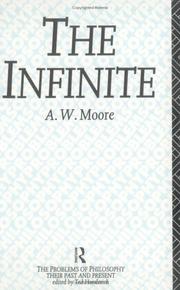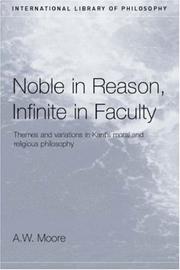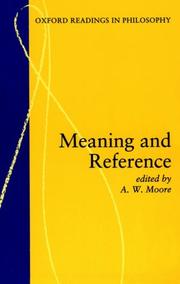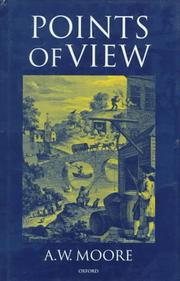| Listing 1 - 10 of 14 | << page >> |
Sort by
|

ISBN: 0415033071 0415070481 Year: 1990 Volume: vol *14 Publisher: London New York Routledge
Abstract | Keywords | Export | Availability | Bookmark
 Loading...
Loading...Choose an application
- Reference Manager
- EndNote
- RefWorks (Direct export to RefWorks)
Metaphysics --- Infini --- Infinite --- Infiniteit --- Infinity --- Oneindigheid --- Unendlichkeit --- Finite, The --- Infinite.

ISBN: 041520822X 0415208211 1280071400 020346009X 1134619685 0203254546 9780203254547 9780203460092 9781280071409 9781134619634 9781134619672 9781134619689 9780415208215 9780415208222 1134619677 Year: 2003 Volume: *17 Publisher: London ; New York : Routledge,
Abstract | Keywords | Export | Availability | Bookmark
 Loading...
Loading...Choose an application
- Reference Manager
- EndNote
- RefWorks (Direct export to RefWorks)
Christian moral theology --- Kant, Immanuel --- Ethics, Modern --- Free will and determinism --- Religion --- History --- Philosophy --- Kant, Immanuel, --- Ethics. --- Religion. --- Ethics --- Compatibilism --- Determinism and free will --- Determinism and indeterminism --- Free agency --- Freedom and determinism --- Freedom of the will --- Indeterminism --- Liberty of the will --- Determinism (Philosophy) --- Deontology --- Ethics, Primitive --- Ethology --- Moral philosophy --- Morality --- Morals --- Philosophy, Moral --- Science, Moral --- Values --- Kant, Emmanuel --- Kant, Emanuel --- Kant, Emanuele --- Ethics [Modern ] --- 18th century --- Religion, Primitive --- Atheism --- God --- Irreligion --- Religions --- Theology --- Kant, I. --- Kānt, ʻAmmānūʼīl, --- Kant, Immanouel, --- Kant, Immanuil, --- Kʻantʻŭ, --- Kant, --- Kant, Emmanuel, --- Ḳanṭ, ʻImanuʼel, --- Kant, E., --- Kant, Emanuel, --- Cantơ, I., --- Kant, Emanuele, --- Kant, Im. --- קאנט --- קאנט, א. --- קאנט, עמנואל --- קאנט, עמנואל, --- קאנט, ע. --- קנט --- קנט, עמנואל --- קנט, עמנואל, --- كانت ، ايمانوئل --- كنت، إمانويل، --- カントイマニユエル, --- Kangde, --- 康德, --- Kanṭ, Īmānwīl, --- كانط، إيمانويل --- Kant, Manuel, --- Ethics, Modern - 18th century. --- Free will and determinism - History - 18th century. --- Religion - Philosophy - History - 18th century. --- Kant, Immanuel, - 1724-1804 - Ethics. --- Kant, Immanuel, - 1724-1804 - Religion. --- Kant, Immanuel, - 1724-1804 --- Kant, Immanuel, 1724-1804

ISBN: 0198751257 0198751249 9780198751250 9780198751243 Year: 1993 Publisher: Oxford: Oxford university press,
Abstract | Keywords | Export | Availability | Bookmark
 Loading...
Loading...Choose an application
- Reference Manager
- EndNote
- RefWorks (Direct export to RefWorks)
This volume presents a selection of the most important writings in the debate on the nature of meaning and reference which started one hundred years ago with Frege's classic essay "On Sense and Reference." Contributors include Bertrand Russell, P.F. Strawson, W.V. Quine, Donald Davidson, John McDowell, Michael Dummett, Hilary Putnam, Saul Kripke, David Wiggins, and Gareth Evans. The aim of this series is to bring together important recent writings in major areas of philosophical inquiry, selected from a wide variety of sources, mostly periodicals, which may not be conveniently available to the university student or the general reader.
Philosophy of language --- Reference (Philosophy) --- Meaning (Philosophy) --- Language and languages --- Langage --- --Philosophie --- --Frege, Gottlob (1848-1925) --- Philosophy --- 4434 --- -Meaning (Philosophy) --- Referring, Theory of --- Theory of referring --- Semantics (Philosophy) --- Foreign languages --- Languages --- Anthropology --- Communication --- Ethnology --- Information theory --- Meaning (Psychology) --- Philology --- Linguistics --- --Frege, Gottlob, --- Language and languages - Philosophy --- Philosophie --- Frege, Gottlob, 1848-1925 --- Référence (philosophie) --- Signification (philosophie) --- Meaning (Philosophy). --- Reference (Philosophy). --- Philosophy.

ISBN: 0198236921 0198250622 0191598054 1282006843 9786612006845 0191519154 9780191519154 9780191598050 9780198236924 9780198250623 6612006846 9781282006843 Year: 1997 Publisher: Oxford : New York : Clarendon Press ; Oxford University Press,
Abstract | Keywords | Export | Availability | Bookmark
 Loading...
Loading...Choose an application
- Reference Manager
- EndNote
- RefWorks (Direct export to RefWorks)
In this unusual and ambitious study, A. W. Moore argues that it is possible to think about the world with no point of view. The result of Moore's thinking leads to a powerful critique of our own finitude.
Idealism --- Idealisme --- Idéalisme --- Realism --- Realisme --- Realisme (Filosofie) --- Réalisme --- Réalisme (Philosophie) --- Empiricism --- Philosophy --- Universals (Philosophy) --- Conceptualism --- Dualism --- Materialism --- Nominalism --- Positivism --- Rationalism --- Animism --- Monism --- Personalism --- Transcendentalism --- Idealism. --- Realism. --- Theory of knowledge
Book
ISBN: 9780521616553 9780521851114 9781139029223 0521851114 0521616557 1139029223 9781139206228 1139206222 9781139204644 1139204645 1107225728 1280568364 9786613597960 1139205420 113920324X 1139201824 1139199560 Year: 2011 Publisher: New York : Cambridge University Press,
Abstract | Keywords | Export | Availability | Bookmark
 Loading...
Loading...Choose an application
- Reference Manager
- EndNote
- RefWorks (Direct export to RefWorks)
This book is concerned with the history of metaphysics since Descartes. Taking as its definition of metaphysics 'the most general attempt to make sense of things', it charts the evolution of this enterprise through various competing conceptions of its possibility, scope, and limits. The book is divided into three parts, dealing respectively with the early modern period, the late modern period in the analytic tradition, and the late modern period in non-analytic traditions. In its unusually wide range, A. W. Moore's study refutes the tired old cliché that there is some unbridgeable gulf between analytic philosophy and philosophy of other kinds. It also advances its own distinctive and compelling conception of what metaphysics is and why it matters. Moore explores how metaphysics can help us to cope with continually changing demands on our humanity by making sense of things in ways that are radically new.
Metaphysics --- Philosophy, Modern --- Modern philosophy --- History --- Philosophy, Modern. --- Métaphysique --- Philosophie moderne --- History. --- Histoire --- Metaphysics. --- Metaphysik. --- Arts and Humanities --- Philosophy
Book
ISBN: 0198823649 9780198823643 0191862258 0192556762 Year: 2019 Publisher: Oxford Oxford University Press
Abstract | Keywords | Export | Availability | Bookmark
 Loading...
Loading...Choose an application
- Reference Manager
- EndNote
- RefWorks (Direct export to RefWorks)
These essays by A.W. Moore are all concerned with the business of representing how things are - its nature, its scope, and its limits. The essays in Part One deal with linguistic representation and discuss topics such as rules of representation and their nature, the sorites paradox, and the very distinction between sense and nonsense. Wittgenstein's work, both early and late, figures prominently. One thesis that surfaces at various points is that some things are beyond representation. The essays in Part Two deal with representation more generally and with the character of what is represented, and owe much to Bernard Williams's argument for the possibility of representation from no point of view. They touch more or less directly on the distinction between0representation from a point of view and representation from no point of view-in some cases by exploring various consequences of Kant's belief that representation of how things are physically is always, eo ipso, representation from a point of view. One thesis that surfaces at various points is that nothing is beyond representation. Each of the essays in Part Three, which draw inspiration from the early work of Wittgenstein, indicate how the resulting tension between Parts One and Two is to be resolved: namely, by construing the first part as a thesis about states of knowledge or understanding, and the second part as a thesis about facts or truths.
Language and languages --- Metaphysics --- Philosophy. --- Philosophy of language
Book
ISBN: 0854097015 Year: 1971 Publisher: London S.R. Publishers
Abstract | Keywords | Export | Availability | Bookmark
 Loading...
Loading...Choose an application
- Reference Manager
- EndNote
- RefWorks (Direct export to RefWorks)
Folklore --- Isle of Man
Book
ISBN: 1855212609 Year: 1993 Publisher: Aldershot Dartmouth
Abstract | Keywords | Export | Availability | Bookmark
 Loading...
Loading...Choose an application
- Reference Manager
- EndNote
- RefWorks (Direct export to RefWorks)
Multi
ISBN: 9780521616553 9781139029223 1139029223 9781139206228 1139206222 9781139204644 1139204645 9780521851114 0521851114 0521616557 1107225728 1139199560 1139201824 113920324X 1139205420 1280568364 9786613597960 Year: 2011 Publisher: New York : Cambridge University Press,
Abstract | Keywords | Export | Availability | Bookmark
 Loading...
Loading...Choose an application
- Reference Manager
- EndNote
- RefWorks (Direct export to RefWorks)
This book is concerned with the history of metaphysics since Descartes. Taking as its definition of metaphysics 'the most general attempt to make sense of things', it charts the evolution of this enterprise through various competing conceptions of its possibility, scope, and limits. The book is divided into three parts, dealing respectively with the early modern period, the late modern period in the analytic tradition, and the late modern period in non-analytic traditions. In its unusually wide range, A. W. Moore's study refutes the tired old cliché that there is some unbridgeable gulf between analytic philosophy and philosophy of other kinds. It also advances its own distinctive and compelling conception of what metaphysics is and why it matters. Moore explores how metaphysics can help us to cope with continually changing demands on our humanity by making sense of things in ways that are radically new.
Metaphysics --- Metaphysics. --- Metaphysik. --- Philosophy, Modern. --- History. --- Arts and Humanities --- Philosophy --- Philosophy, Modern --- History --- Métaphysique --- Philosophie moderne --- Histoire
Digital
ISBN: 9781400827091 9780691134093 Year: 2009 Publisher: Princeton, N.J. Princeton University Press
Abstract | Keywords | Export | Availability | Bookmark
 Loading...
Loading...Choose an application
- Reference Manager
- EndNote
- RefWorks (Direct export to RefWorks)
| Listing 1 - 10 of 14 | << page >> |
Sort by
|

 Search
Search Feedback
Feedback About UniCat
About UniCat  Help
Help News
News